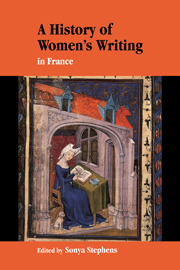Book contents
- Frontmatter
- Contents
- Notes on contributors
- Introduction
- 1 Female voices in convents, courts and households: the French Middle Ages
- 2 To choose ink and pen: French Renaissance women's writing
- 3 Altering the fabric of history: women's participation in the classical age
- 4 The eighteenth century: women writing, women learning
- 5 Eighteenth-century women novelists: genre and gender
- 6 The nineteenth century: shaping women
- 7 1900–1969: writing the void
- 8 From order to adventure: women's fiction since 1970
- 9 Changing the script: women writers and the rise of autobiography
- 10 Women poets of the twentieth century
- 11 Voicing the feminine: French women playwrights of the twentieth century
- 12 Feminist literary theory
- Bibliographies
- Index
12 - Feminist literary theory
Published online by Cambridge University Press: 25 September 2009
- Frontmatter
- Contents
- Notes on contributors
- Introduction
- 1 Female voices in convents, courts and households: the French Middle Ages
- 2 To choose ink and pen: French Renaissance women's writing
- 3 Altering the fabric of history: women's participation in the classical age
- 4 The eighteenth century: women writing, women learning
- 5 Eighteenth-century women novelists: genre and gender
- 6 The nineteenth century: shaping women
- 7 1900–1969: writing the void
- 8 From order to adventure: women's fiction since 1970
- 9 Changing the script: women writers and the rise of autobiography
- 10 Women poets of the twentieth century
- 11 Voicing the feminine: French women playwrights of the twentieth century
- 12 Feminist literary theory
- Bibliographies
- Index
Summary
The title of this chapter is misleading if it implies a coherent body of thought which might be termed ‘French feminist literary theory’. Furthermore, it is not clear that feminist literary theory as such is the object of many of the leading French thinkers. Most of the key French literary theorists are men, and few are feminists as we would understand the term. Few of the French structuralists and poststructuralists feel any awkwardness in using he/man language, for example, despite their close attention to linguistic detail. Many influential feminists in France come from disciplines other than literary studies: for instance, Christine Delphy from sociology or Michèle Le Dœuff from philosophy. And yet French theory in the second half of the twentieth century has proved enormously influential both on feminism and, to an even greater extent, on literary theory. The influence of French theory has been felt not only in the anglophone world, where the appetite for structuralism and poststructuralism has been huge, but also in countries as diverse as Brazil, India or Japan. Although we should note that within different countries the question of the relation between elite and subaltern culture varies and this affects the purchase of particular kinds of theory. In sum, French feminist literary theory is largely practised outside France albeit under the influence of France.
- Type
- Chapter
- Information
- A History of Women's Writing in France , pp. 236 - 250Publisher: Cambridge University PressPrint publication year: 2000



